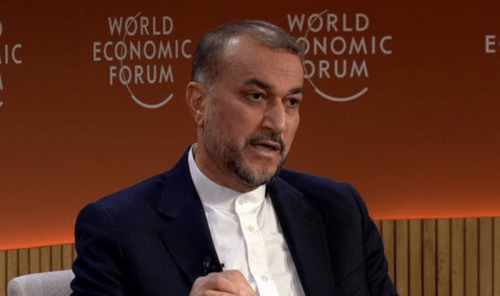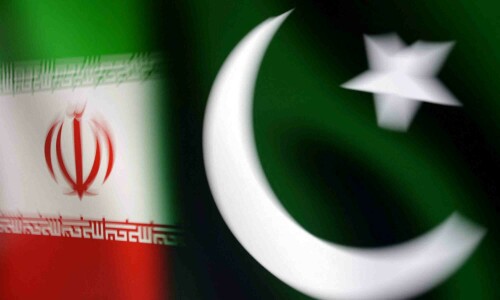The Foreign Office (FO) said on Monday that Iran’s foreign minister Hossein Amir Abdollahian would visit Pakistan on January 29.
The visit comes days after tensions escalated between the two countries following an Iranian air strike in Pakistan, leading Islamabad to strike terrorist hideouts in the neighbouring country’s Sistan-Baluchestan province.
“Following the telephone conversation between the foreign ministers of Pakistan and the Islamic Republic of Iran, it has been mutually agreed that ambassadors of both countries may return to their respective posts by January 26, 2024,” the FO said in a statement.
The FO said that that the Iranian foreign minister would travel to Pakistan on Jan 29 at the invitation of FM Jilani.
A similar statement was also issued by the Iranian foreign ministry.
Information Minister Murtaza Solangi credited FM Jilani, saying that he “deserves all the credit for his visionary engagement and managing possibly one of the fastest de-escalation of the diplomatic history”.
Last week, Iran had launched attacks in Pakistan targeting what it described as bases for the militant group Jaish al-Adl in the border town of Panjgur in Balochistan, Iranian state media reported, prompting strong condemnation from Islamabad and downgrading of diplomatic ties.
Less than 48 hours later, Pakistan struck “hideouts used by terrorist organisations namely Balochistan Liberation Army (BLA) and Balochistan Liberation Front (BLF)” in Iran’s Sistan-Baluchestan province, in an intelligence-based operation codenamed ‘Marg Bar Sarmachar’.
Iran’s IRNA news agency had reported that nine people were killed in the attack targeting a village in the city of Saravan, with Iranian Interior Minister Ahmad Vahidi saying all the dead “were foreign nationals”. Iran had condemned strikes and summoned Pakistan’s charge d’affaires “to protest and request an explanation from the Pakistani government”.
In Islamabad, the escalation had prompted a high-level meeting of Pakistan’s premier authority on security and foreign policy, the National Security Committee. It was chaired by caretaker Prime Minister Anwaarul Haq Kakar with cabinet members, the chairman of the Joint Chiefs of Staff Committee, the chiefs of the Army, Navy and Air Staff, and other heads of intelligence in attendance.
During the hours-long meeting on Friday, the NSC had ratified the move towards reducing tensions between Pakistan and Iran and underscored a commitment to addressing mutual security concerns.
“The forum (NSC) expressed that Iran is a neighbourly and brotherly Muslim country, and existing multiple communication channels between the two countries should be mutually utilised to address each other’s security concerns in the larger interest of regional peace and stability,” a statement issued by the prime minister’s office after the meeting said.
The NSC hoped that both countries “would mutually be able to overcome minor irritants through dialogue and diplomacy and pave the way to further deepen their historic relations” but at the same time emphasised that any violation, under any pretext, would be met with the state’s full force.
That sentiment was reciprocated by Tehran, whose foreign ministry, in a statement later that day, had said Iran “adheres to the policy of good neighbourliness and brotherhood between the two nations and the two governments”.
These exchanges had subsequently set the stage for a phone conversation between FM Jilani and his Iranian counterpart on Friday.
The two foreign ministers had underscored the importance of collaboration and synchronising efforts at the operational level, with a specific focus on counterterrorism and other mutual concerns. They also committed to de-escalating tensions.
Furthermore, the foreign ministers had deliberated on the reappointment of each country’s ambassadors to their respective capitals, signalling a move towards restoring diplomatic normalcy.
Jilani had also invited Amirabdollahian to visit Islamabad. The Iranian foreign minister, according to the Iranian side, had emphasised that the assurances about security and military cooperation should be seriously pursued.















































Dear visitor, the comments section is undergoing an overhaul and will return soon.